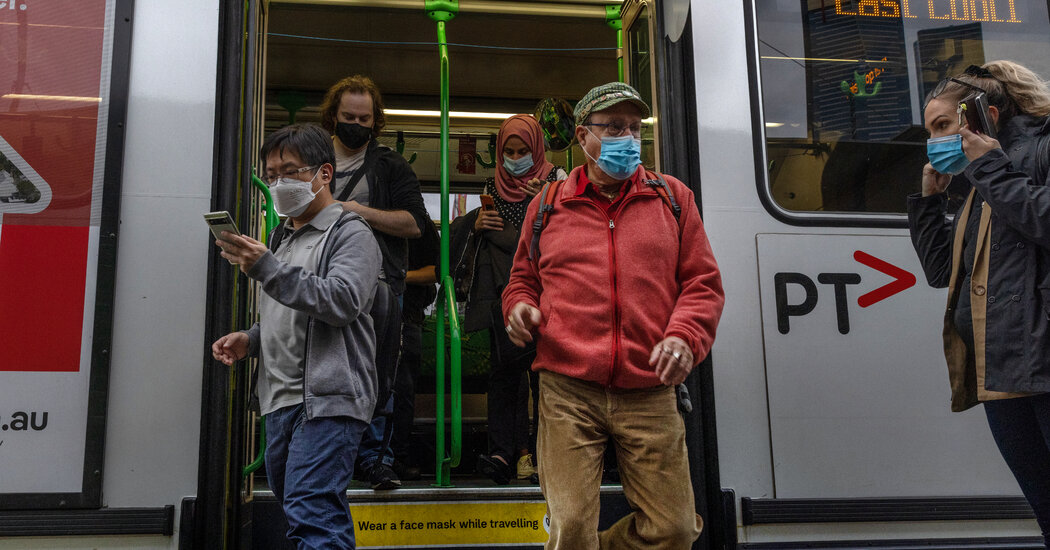
Australians go to the polls on Saturday to choose a government as the country, emerging from two years of Covid-fueled isolation, faces rising inflation, persistent anxiety about climate change and growing foreign policy challenges.
After nine years in power, the conservative coalition — now led by Prime Minister Scott Morrison — is locked in a tight race with the Labor Party and its leader, Anthony Albanese.
With few major policy differences or dramatic proposals, the election has come to be seen as a referendum on Mr. Morrison’s conduct and performance in office. He has sought to emphasize his steady management of the economy and Australia’s rapid response to Covid, while his opponent has pointed to his failure to keep housing affordable, his absence during the 2020 bush fires and avoidance on climate change policy, and his aggressive, partisan approach to politics, which has alienated many women.
Rising support for minor parties and a new wave of independent candidates, most of them women who are campaigning for stronger action on climate change and a federal anti-corruption commission, could lead to a minority government that might take several days of negotiating to form. But Labor has been building momentum, and is increasingly confident about a clear victory.
What’s at Stake
Australia has managed the pandemic relatively well, keeping its per capita death toll low by shutting its international and state borders while funneling public money to workers, businesses and the health care system. Now that the country is highly vaccinated and open again, the government’s job for the next few years will involve shaping the recovery.
Mr. Morrison, 54, has argued that now is not the time to shift to a Labor government. “It’s not just about who will make things better, and I believe we will,” he said last week. “But it’s also who can make them worse.”
To bolster its chances, the conservative coalition has made about $2 billion worth of pledges for infrastructure and energy projects, along with smaller local projects like sports facilities.
Mr. Albanese, 59, has promised investment in roads and transportation while emphasizing that Labor will do more for “the caring economy,” which includes child care workers, educators and nursing home workers. Facilities for the aged have been struggling with reports of treatment lapses and miserable conditions.
Labor has also promised to increase funding for universities, which were left out of the coalition’s Covid-assistance plans. And though it has not ruled out investment in coal, Labor has said it will move more quickly to reduce carbon emissions and address climate change.
Australia’s emissions reduction target for 2030 — 26 percent from 2005 levels — has been described by other world leaders as a disappointment. It’s half what the United States and Britain have promised.
But whoever wins the election will not just have to manage domestic concerns and international pressure on climate change. Australia also faces an increasingly tricky security environment.
Understand Australia’s Federal Election
Australians go to the polls on May 21 as the country faces rising inflation, climate change anxiety and foreign policy challenges.
The country’s relations with China have been on ice since at least 2017, when Australia passed foreign interference legislation and China responded with import bans on wine, beef and other Australian products. Beijing has also made inroads in the Pacific islands, Australia’s traditional sphere of influence, with the Solomon Islands signing a secretive security agreement with China last month.
These will be among the issues discussed at the next meeting of the Quad — Japan, the United States, India and Australia — which is scheduled to take place in Tokyo on May 24, three days after Australia’s election.
There is not much distance between the two parties on the challenge China represents or on Australia’s push toward a stronger alliance with the United States.
Who’s Running?
Mr. Albanese took over as Labor leader after the party’s 2019 election loss, and he is known for being a quieter, more collaborative brand of boss than his predecessor, Bill Shorten.
He was raised by a single mother in public housing and often says she instilled in him a passion for three great faiths: the Catholic Church, the Australian Labor Party and the South Sydney Rabbitohs, his local rugby team.
He was elected to Parliament in 1996, rising to become deputy prime minister in 2013 with the Labor government led by Kevin Rudd.
Despite all his time in government, Mr. Albanese was relatively unknown to most Australians until recently. As opposition leader and as a candidate, he has constructed a “small target” approach, making few bold policy pronouncements and seeking to minimize Labor’s differences with the coalition on traditional hot-button issues like taxes.
Mr. Albanese’s effort to make voters focus on Mr. Morrison hit obstacles at first, as the Labor leader made a few gaffes near the official start of the campaign. But he found his footing during a pair of debates during which he focused on wage increases and other traditional Labor issues while standing up to the more combative prime minister.
Mr. Morrison has led Australia’s government — a coalition of the Liberal and National parties — since 2018. An energetic campaigner who has presented himself as the leader for “quiet Australians” who want a steady hand on the economic tiller, he had a reputation for being a moderate earlier in his career. But as prime minister, he has often lined up with the more conservative wing of Australian politics, especially on climate change.
Like Mr. Albanese, he is a devoted rugby fan who grew up in Sydney — in his case in the wealthier eastern suburbs, where his father was a police officer and municipal council member.
After working as a marketing executive for Tourism Australia, he reached Parliament in 2007, representing a handful of suburbs in the southeastern corner of Sydney.
He rose quickly, becoming the minister for immigration and border protection in the government of Prime Minister Tony Abbott, where he oversaw a hard-line approach to asylum seekers — with boats turned back by the Australian military and refugees placed in offshore detention.
He served as treasurer under Prime Minister Malcolm Turnbull, until he took power in 2018 after an intraparty coup initiated by members who resisted Mr. Turnbull’s moderate stance on climate change and other issues.
What Are the Major Issues?
On a national level, voter surveys show that Australians are most concerned about inflation and the cost of living, especially the exorbitant price of housing in Sydney, Melbourne and other major cities.
In most of the country’s middle-class districts, economic issues are dominant, but in a number of the electorates that could define which party wins, there are two other election dynamics playing out.
In wealthier districts around Sydney and Melbourne, several independent candidates — mostly professional women — are challenging Liberal incumbents with campaigns focused on climate change solutions, gender equity and a return to civility to politics.
And in less urban areas, the election is being fought more on culture war and identity issues. Mr. Morrison handpicked a candidate who has lobbied against allowing transgender women to play women’s sports, and he has at times made the issue a focus of his campaign.
“There are three campaigns being fought,” said Peter Lewis, a seasoned pollster and executive director of Essential, a progressive communications and research company. “You’ve got a cultural election, an economic election and a post-materialist election” — focusing on quality of life — “and they’re all playing out in different parts of Australia.”
Who’s Leading?
The latest voter surveys show Labor leading by a few points. Mr. Morrison’s approval ratings have been falling for months, and neither he nor Mr. Albanese is drawing enthusiastic support. Voters have signaled they are more dissatisfied than satisfied with both of them.
Election projections in Australia are notoriously hard to trust. The country has compulsory voting and preferential voting, letting people rank their choices, and a large swath of the electorate decides at the last second. By some counts, a quarter of all voters remain uncertain or not confident about their ultimate choice.
In 2019, polls showed Labor with a slight edge — but Mr. Morrison and the coalition won an upset victory.
This time around, analysts are suggesting a high probability of a hung Parliament, with neither the coalition nor Labor winning the 76 seats needed to form a government.
If that happens, minor parties like the Greens on the left or One Nation on the right — or some of the independents, if they win — could be the kingmakers who decide which way Australia’s next government goes.




